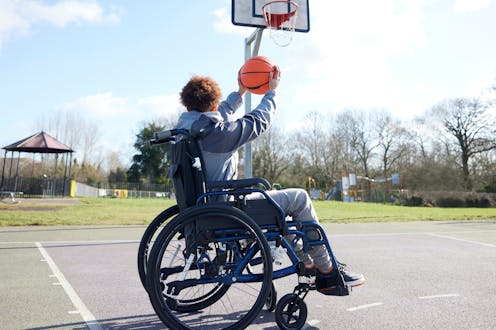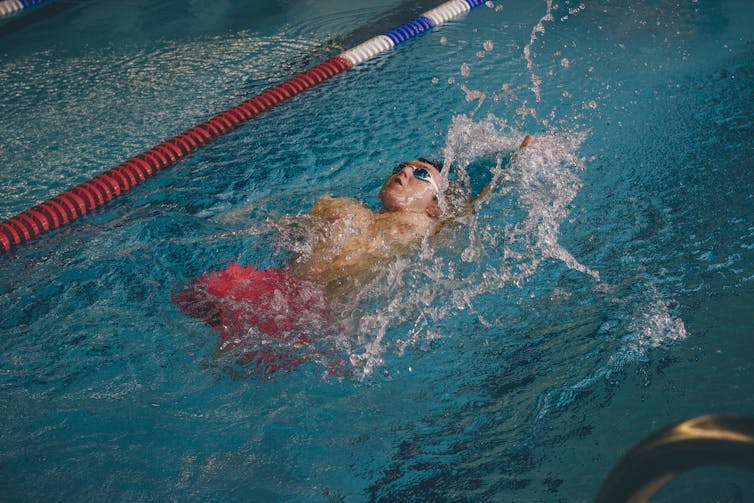
Daisy Daisy/Shutterstock
Access to physical activity and sport is not equal. Children and young people with disabilities are less likely to engage in physical activity and sport, as there are significant barriers to their participation.
Parents are often vital in helping their children become involved in sport. In our research, we spoke to 11 parents of children and young people aged between 12 and 25 who were competing in at UK or international level in parasport. We wanted to understand their experience supporting their children’s sport participation and parasport pathways. Their children were competitive in a range of parasports, including wheelchair tennis, athletics and swimming.
For most parents, their child’s sense of social belonging was their biggest concern. This had led them to seek out opportunities for their child to find social connection with others through sport.
All of the parents in our study had children that attended mainstream schools. School is often one of the most important opportunities for children to develop social relationships. But our parents told us that, for their children, school was often isolating. Most of the parents felt school offered little for their children in relation to developing meaningful social relationships. One parent told us:
He’s emotionally very up and down, and the downs are mainly to do with feeling socially isolated and missing out on things. I don’t think it’s been a particularly positive experience, school.
The parents we spoke to didn’t feel that PE at school offered their children a level playing field to engage with sport and physical activity. They had to look elsewhere to find social and confidence-building opportunities for their children, as well as for the chance to take part in more rewarding sporting activities.
The right opportunities
For may of the parents, parasport opportunities for their children were difficult to access and could be expensive. One parent told us that for years, they did a four-hour round trip each week to a city across the country so that their son could play wheelchair basketball.
One of the reasons children with disabilities are less active than their non-disabled peers is a lack of local opportunities – and poor signposting to local opportunities that were available.
For the parents we spoke to, many of the opportunities which led to their child’s engagement and success in sport started with specific disability organisations, such as the Dwarf Sports Association, which provide a platform for children with disabilities to try out sport.
However, our research showed that pathways toward parasports are difficult for parents to navigate. Parents talked about spending hours doing internet research to find the right opportunities for their child to participate in sport.

DGLimages/Shutterstock
Talent identification was often purely through happenstance. For some of our parents, their child’s talent was noticed by others when they attended disability-specific events, and these people were then able to direct them to appropriate coaches or clubs. Parents felt that better signposting for disability sport opportunities was needed.
Building identity
Despite these challenges, parents felt that their effort and commitment was both necessary and worth it. One parent told us:
You have no choice, there aren’t any other options. That’s why you have to have that commitment.
The parents we spoke to felt that getting their child involved in parasport was one of the best things they could do for their child. They told us how being involved in parasport had helped their child develop friendships, supported their identity development as a disabled person and built confidence and independence.
Without this sport she wouldn’t be who she is, it’s her social life… it’s everything.
For some children, taking part in parasport also improved their social status at school with their non-disabled peers. This helped parents to feel less worried about their child’s future. One parent told us:
It’s helped with his social confidence, his friendships, physically his upper body is so strong now that you know it means he can be more independent at a practical level. So, I worry less about him going off to university, looking after himself.
Parents also benefited from the social support they received from other parents of children with disabilities. They helped them navigate complex issues, like knowing where apply for funding or a blue parking badge.
Sport can be a powerful resource for children and young people with disabilities, but a lack of opportunities or difficulty accessing the ones that do exist can prevent them from taking part. These barriers need to be addressed so that more children can benefit from being involved in sport whether in school, in the community or at elite levels.
Some sport national governing bodies are already offering excellent opportunities for young people with disabilities, such as Flyerz Hockey – hockey clubs where people with and without disabilities of all ages play together. If youth sports programmes at all levels consulted and worked with young people with disabilities and their parents, support networks which reflect the complexity of their lives could be developed.
![]()
The authors do not work for, consult, own shares in or receive funding from any company or organisation that would benefit from this article, and have disclosed no relevant affiliations beyond their academic appointment.

